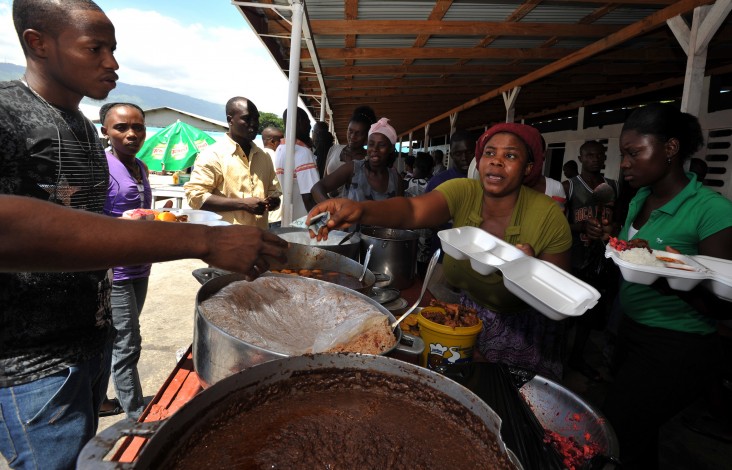Home » Reports & Data » Progress » Transforming Lives » Cooks Switch from Charcoal to Gas for Better Health in Haiti

A vendor dishes out meals at an industrial park in Port-au-Prince, Haiti.
Kendra Helmer
New technology makes for cleaner environment
"This space is not only attractive, but it is also a healthy and safe environment for the cooks and the workers who buy their meals every day."
A USAID-financed program in Haiti is improving air quality for cooking vendors and is expected to save more than 500 tons of charcoal a year.
The three-year Improved Cooking Technology Program ("Recho Pa’w" in Creole) aims to promote sustainable energy for cooking and reduce the consumption of charcoal by large-scale users as well as households.
To reduce the negative environmental impact of cooking with charcoal, Recho Pa’w partnered with the SONAPI industrial park in Port-au-Prince and SODIGAZ, a Haitian propane gas distributor, to convert the SONAPI public dining zone from charcoal to liquid propane gas.
On March 28, 2013, the program inaugurated a new modern cooking center at SONAPI. All 52 vendors, principally women, who prepare food for roughly 12,000 workers a day, replaced their charcoal stoves with propane gas cookers. This switch resulted in reducing charcoal use by 10 tons a week—dramatically improving the air quality in their work place and contributing to the preservation of Haiti’s environment.
At the event, Haiti’s Minister-delegate of Energy Security Rene Jean Jumeau said the center's launch was "a historic moment, the result of a long effort that must be replicated."
“I feel good. I now live and work differently,” said Juliette*, a vendor at SONAPI. Another vendor, Soeurette*, is also satisfied with the transition to propane. "Going forward, I have decided that propane is my favorite choice for cooking,” she said.
The Recho Pa’w program, which began in Port-au-Prince in February 2013, works with the Haitian Government and private sector. The partnership focuses on SONAPI’s goal of improving the environmental impact of the food services sector, presenting the program as a model to be replicated in other urban areas similar to Port-au-Prince. A tripartite partnership agreement was signed between USAID’s Recho Pa’w program, SODIGAZ and SONAPI.
Tina Balin Berridge, special adviser/government liaison for USAID/Haiti’s Infrastructure Office, said that, in addition to the cooking zone in the SONAPI industrial park, USAID would continue to fund many projects that are environmentally conscious. "This space is not only attractive, but it is also a healthy and safe environment for the cooks and the workers who buy their meals every day," she said.
This partnership—which led to the complete conversion to propane in SONAPI’s cooking zone—is expected to save 540 tons of charcoal annually. The new healthier cooking zone in SONAPI represents a successful model to be copied in other public dining zones in the Port-au-Prince metropolitan area—and an important step toward preserving Haiti’s fragile environment.
USAID is working on other projects to conserve the environment in Haiti, including two Development Innovation Ventures awards announced earlier in 2013. One, awarded to the University of Maryland, is for testing technological solutions to two critical needs in Haiti—effective wastewater treatment to help curb the cholera epidemic, and decentralized, low-cost energy sources. The second award went to Carbon Roots International, a U.S.-based nonprofit organization, for a project that addresses energy and environmental challenges by using biochar technology to convert agricultural waste, or biomass, into both cooking fuel and a fertilizer alternative.
*Full names not available.
Additional Resources







Comment
Make a general inquiry or suggest an improvement.